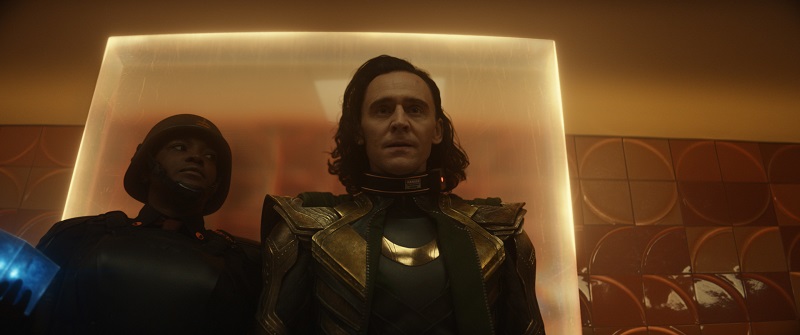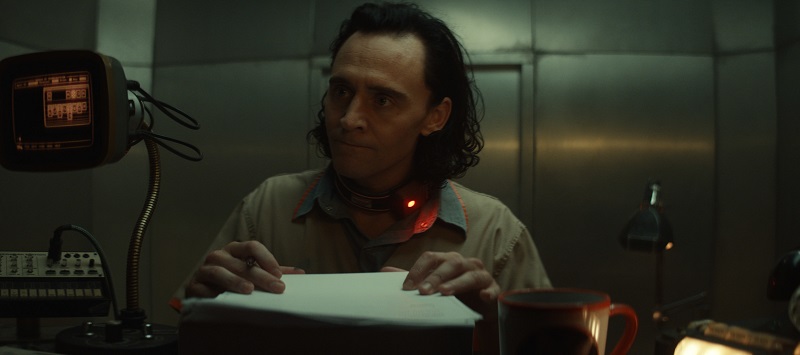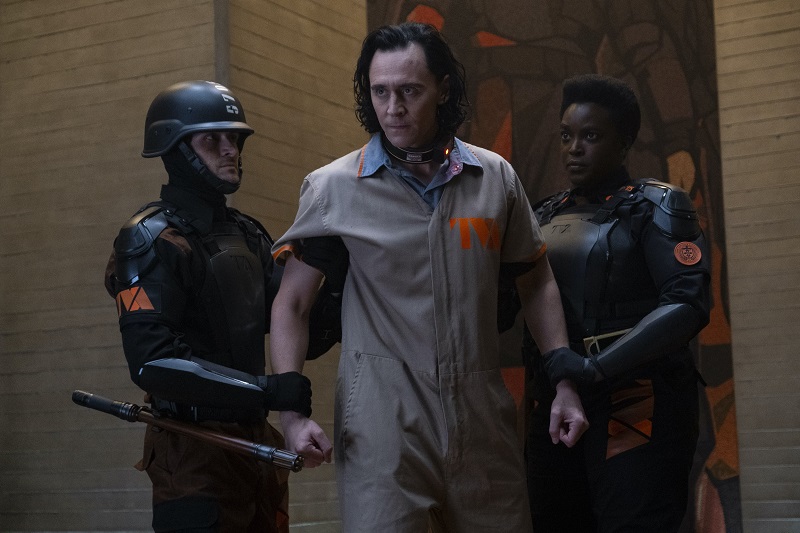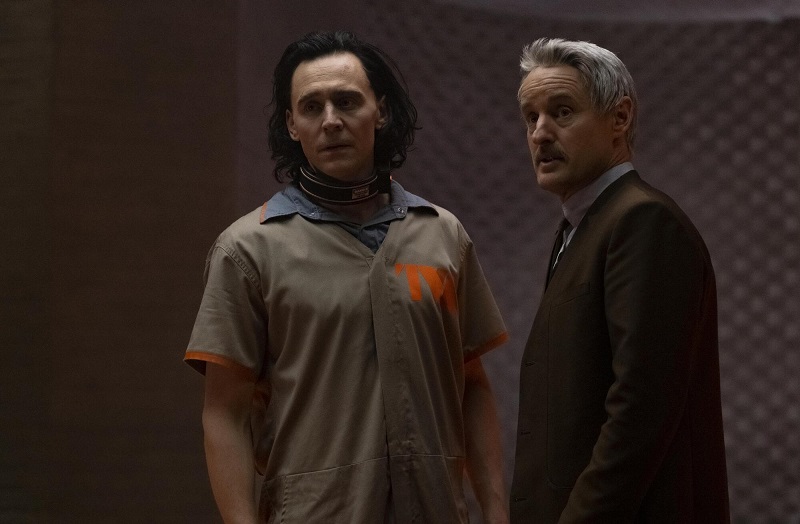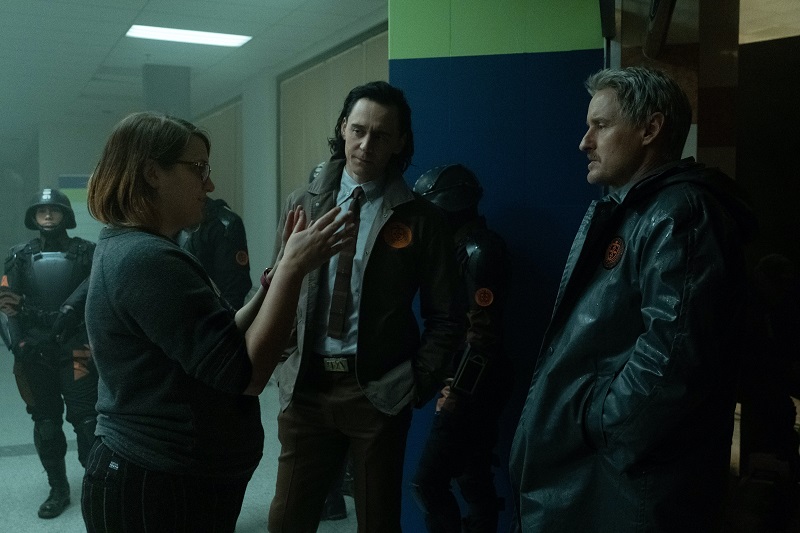Loki, infamously the God of Mischief from the Thor and Avengers movies, has his own show over on Disney+! We can see why the streaming network decided to move up the premiere date. Initially, Loki was set to drop on the 11th and now viewers get to dive into this new (and terrific) Marvel TV gem two days earlier on the ninth.
How can you go wrong with an entire program dedicated to Tom Hiddleston’s iconic turn as Thor’s (Chris Hemsworth) younger brother, who has long resented the spotlight his sibling receives. Here, he’s out on his own. But, how and why?
Without spoiling a thing, let’s just say that after the Battle of New York, Loki was in the custody of The Avengers, and was on his way to an Asgardian prison. Thanks to a little Tesseract magic, the Asgard prince winds up messing the timeline of the universe, and that lands him in the Time Variance Authority (TVA) custody.
Instead of winding up reset in some manner—let’s just say that it looks horribly uncomfortable—Loki decides to help Owen Wilson’s Mobius M. Mobius pursue a time-jumping baddie whose work would normally make the titular soul proud. Seems this villain is crossing time and space and taking out TVA officers and wreaking havoc with the Timekeepers’ approved timeline. Yes, there is a trio of beings who oversee the timeline to ensure its peaceful continuation and that it never gets abused.
After being blessed with having access to the first two episodes of the show for this review, it must be shouted from the hills what a joy this latest Marvel/Disney+ collaboration is and what makes Loki so special is layered. Simply put, the chemistry between Wilson and Hiddleston is off the charts. It’s both comedic, informative, highly entertaining, and above all else—completely organic how these two’s relationship develops.
Yes, from the get-go thoughts in the old noggin’ will certainly center on trust. How, and why, does Mobius trust Loki? If anyone has shown he is not worthy of an alliance, it is the Asgard prince. The thing is, we get the impression from these first two episodes that the TVA is at the end of their rope and with Wilson’s glowing endorsement, aligning with the man who could do something like this Variant (that’s what they call beings who mess with the timeline) is actually their best shot at stopping the killing and the inherent risk to the timeline.
Wilson and Hiddleston make Loki your latest television obsession. Of course, you knew that Hiddleston would be amazing. Only he could make a villain as beloved as Loki is in popular culture. The British actor continues that love affair between baddie and the audience with these first two episodes. Dare we say, even more so? There’s one particular scene where it is pretty clear that Loki has a heart, and it is capable of breaking. You almost want to respond by leaping through the TV screen and give him a hug.
Wait a minute! Isn’t this the guy who started the Battle of New York and largely opened the door for the big baddie, Thanos, to do what he did—including wiping out half the planet? Well, yes. But…
…and isn’t Loki the guy who repeatedly tried to have his brother Thor killed and was a large part why his father Odin (Anthony Hopkins) perished? Again, yes.
But there is something about Hiddleston’s characterization of Loki that even us hardened fans are always—no kidding, like always—ready to give him his 353rd chance. They’ll be studying Hiddleston and Loki for years in screenwriting and filmmaking classes as the gold standard for crafting a villain that audiences adore and how an actor or actress can make a characterization their own and, in the process, endear themselves forever for playing someone who does absolutely stunningly horrible things!
Here we are again, signing up to go on a fight for justice with Loki as the sidekick and enormous contributor to the endeavor. Will it work out or conclude any differently than the other times? Who knows? But you know what? That’s what makes our love affair with Loki so rewarding. Even if the entire affair blows up in our face, there is a solid chance that Hiddleston as Loki—if those Marvel magicians can find a way—will be given another chance to do something to help a noble cause, even if he makes it all about himself.
That’s why we love him and will continue to love him. As I said, they’ll be studying this Loki-Hiddleston-Marvel dynamic for decades to come. Writers should be so fortunate to have an antagonist as appealing, endearing, funny, and above all else, compelling as what Marvel scored when Kenneth Branagh (director of Thor) tapped Hiddleston to be his Loki.
Wilson deserves a paragraph all to his own! Sure, his camaraderie with his scene mate is outstanding, but that also begins with each actor’s hard work before they even show up on the set. The Wedding Crashers star makes his MCU debut in Loki and it was definitely worth the wait. Wilson is outstanding as Mobius. Before he and Hiddleston even share a single scene, Wilson has carved out a character with his TVA investigator that is as much an addictive mystery as the one he is trying to solve with his new pal, Loki.
The actor inserts his usual “aw, shucks” charm, but his turn as Mobius goes much deeper than that. There is something driving this man, and after two episodes, we are no closer to defining that than before the show even commenced. That’s a good thing. Keep ‘em guessing is always a positive in the developing a character department.
It’s fascinating, Mobius talks repeatedly through the first two episodes about discovering “what makes Loki tick?” It’s an interesting line coming from him as when we look at the screen and see him doing what he does with such conviction, we’re left asking the same question, albeit with his name inserted instead of Loki’s!
The cast, beyond Hiddleston and Wilson, are sublime. Gugu Mbatha-Raw (who blew us away in The Morning Show opposite Reese Witherspoon, Steve Carell, and Jennifer Aniston), stars as Mobius’ boss (that’s all you’ll get out of this guy!). When isn’t Mbatha-Raw riveting? Never! She’s a fantastic addition to this world. Joining her is Sophia Di Martino, Wunmi Mosaku, and the ultimate character actor, Richard E. Grant.
Marvel Studios does a lot of things well like a six-volume book set would just scratch the surface. One element that doesn’t get talked about enough is casting. It started with placing the right actors and actresses in the right roles filling out The Avengers. Then, there’s the tough task of giving us villains worthy of the stellar list of thespians who have inhabited them. Check and check. They’ve done it again with Loki and let’s not forget how fantastic of a job they did with the two previous shows that preceded this one—WandaVision and The Falcon and the Winter Soldier.
Managing this entire affair is director Kate Herron, with Michael Waldron working his wizardry as head writer. The pair firmly have a hand on the MCU and everything that entails. But in the sometimes thankless task of world-building in a universe that is already as rich as they come, they have crafted a landscape in Loki that is as original as they come. The production design team, led by Kasra Farahani (art director of Black Panther and Captain Marvel), has crafted a world (particularly at the TVA itself) that is hard to define in terms of era. It feels like the 50s, but with tech that is otherworldly. Farahani and the team truly outdid themselves and continues a Marvel staple that is production design that has given us worlds that previously only existed in our imagination and on the pages of Marvel comics.
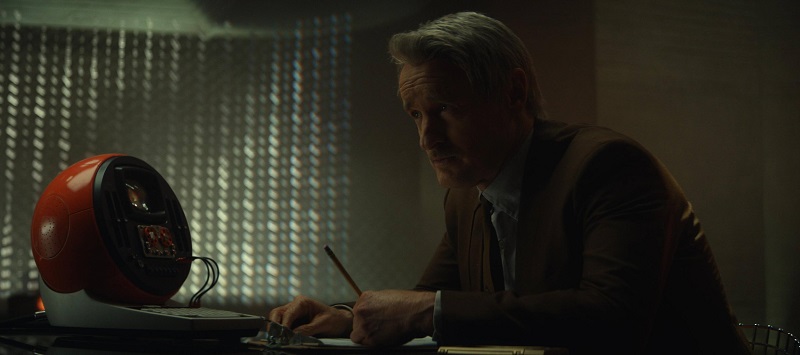
Also stellar is the costume design by Christine Wada and score by Natalie Holt. As is the case with every Marvel film and show thus far, there is a bar that has been set for everyone who has come before in the MCU and anyone who accepts a gig on a Marvel film (whether in front or behind the camera) knows the pure excellence that has come before their work. No one wants to be the weak link and that unspoken pressure has a way of turning great artists into ones who are doing work beyond what even they thought was possible.
Grade: A

